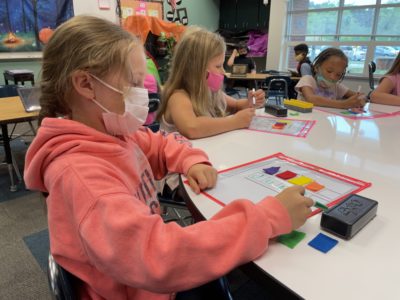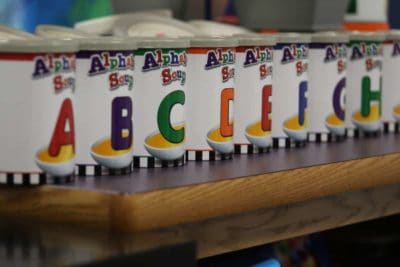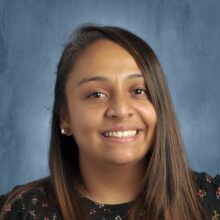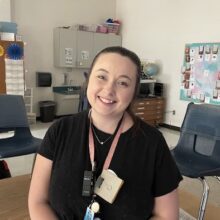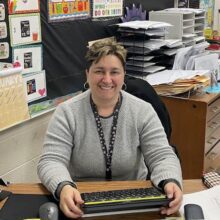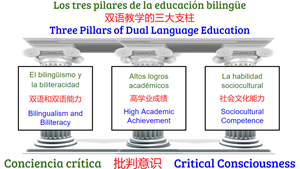
|
|
Over the past two years, elementary school teachers across the state of North Carolina have tackled LETRS, an intensive professional learning training rooted in the science of reading. More than 11,000 teachers and administrators have already completed the training, with another 27,000 slated to complete it by next summer.
LETRS equips teachers with a deeper understanding of the content, better strategies, and a more comprehensive approach to teaching literacy, helping them better reach young readers on all levels.
As more and more teachers go through LETRS training, literacy outcomes for North Carolina’s youngest students continue to improve — and their teachers are sharing how impactful LETRS training has been on their instructional practices and student growth.
Angelica Yepes Velosa: Fruitful professional development for multilingual classrooms
LETRS has been a long but fruitful professional development. It introduces educators to this fantastic world of the science of reading — adding broad linguistics tools and knowledge of phonology, semantics, syntax, morphology and pragmatics to be used in our multilingual classrooms. It shows us how the English language, with all its irregularities, can be explained in detail to help our students become better readers.
LETRS unlocks phonemic awareness routines, prefix and suffix strategies to play with words, finds the semantic relationship between English and other languages, and look for cognates, along with the Greek or Latin scientific roots. As a second-grade dual language immersion educator teaching Spanish and English literacy, LETRS has impacted my daily practices. It has refreshed the why and the how of my previous linguistics knowledge and practices, and has proven that the reading process is not only a kindergarten teacher responsibility. On the contrary, no matter what grade you are teaching, we are all able to foster students’ reading and writing abilities to help them increase their success.
My emergent bilingual students feel comfortable using and playing with sounds and words by making sense of sentence structures to bridge them with their native language. Their reading and writing learning process has been impacted positively in both languages. They are gaining a better understanding of how the English language works and how it is connected it with Spanish. The science of reading in English has transformed my practices to better support my bilingual students with literacy in their new language.
Nina Workman: Mastery for teachers
LETRS is a wonderful learning resource for educators. The program provides educators with a deep knowledge to be literacy and language experts. After completing the units as a teacher, you will have mastered phonological awareness, phonics, fluency, vocabulary, comprehension, writing and language.
LETRS has improved my small group lesson plans by teaching me relevant skills and better lesson planning methods. Through the implementation of sound walls in our classrooms instead of word walls, our students’ fluency has increased in speaking and reading. LETRS is the perfect educational resource for us lifelong learners!
Viviana Quindio Camacho: A comprehensive framework for teaching literacy skills
I am a fourth-grade dual language teacher at Old Town Elementary School and wanted to take a moment to share with you the significant benefits that LETRS has had on my teaching practice. Since its introduction, I have witnessed improvements in overall classroom reading and writing practices. First and foremost, LETRS has provided me with a current, structured, and comprehensive framework for teaching literacy skills.
Winston-Salem/Forsyth County Schools’ Dual Language program, that I proudly represent, aims to have bilingual, bi-literate, and bi-cultural students. A lot of the information learned with LETRS has helped me to better tailor my instruction to meet the diverse needs of my students. In my classroom, I have students who are at different points of language proficiency, which requires creating lesson plans that can help them achieve fluency starting with finding ways to help them develop their potential.
LETRS® incorporates a variety of elements that invite teachers and students to go deeper into reading comprehension skills. Something that I find extremely useful is how the topics are meticulously classified and organized. This has helped ease the learning process for teachers and students as it provides specific tools to tackle students’ needs with strategies that are easy to find, without the struggle of seeking countless supplemental sources.
Additionally, since LETRS focuses on a data-driven approach and proposes several ways to monitor each student’s progress, it has provided me with valuable insights into individual strengths and areas where my students may require improvement. This has enabled me to provide targeted interventions and support for struggling readers.
An ongoing investment
The growth the state of North Carolina is seeing in literacy could not be achieved without the time, energy, and dedication shown by educators statewide. LETRS is an ongoing investment in the teachers and the future of North Carolina, allowing the state to truly and sustainably change the trajectory of students in North Carolina’s public schools.
Recommended reading
